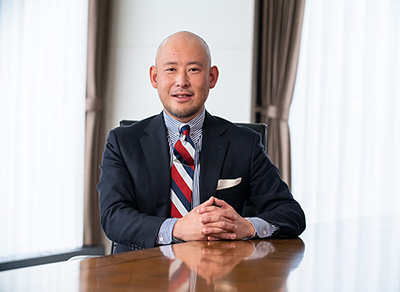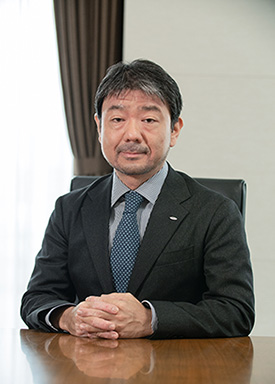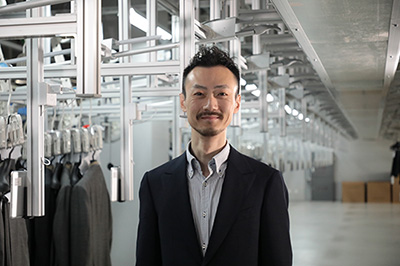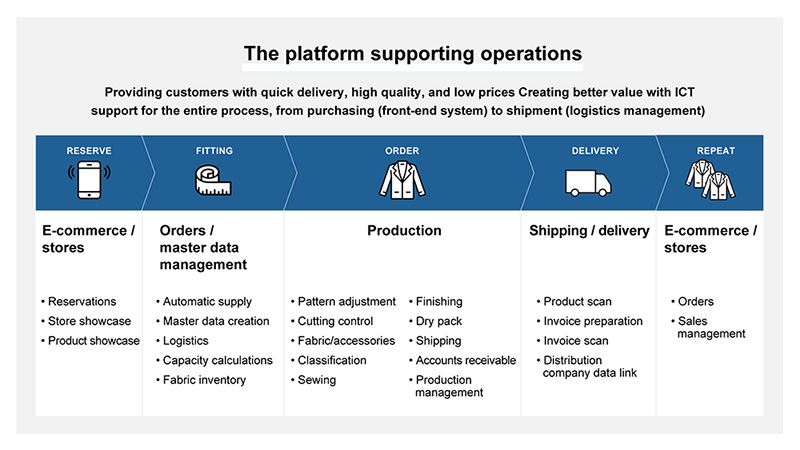Digital Transformation (DX) in the Era of Mass Customization: ICT-based Business Processes Supporting Skilled Workers
In October 2017, Onward Holdings launched “KASHIYAMA the Smart Tailor,” a novel and successful business that effectively utilizes ICT to achieve a flexible production system in the era of mass customization. To realize the aim of providing high-quality made-to-measure suits at reasonable prices (as low as 30,000 yen) and in as short as one week, the company built a new factory that fully utilizes ICT in Dalian, China. Fujitsu, by bringing together its experts across Japan and China, supported Onward Holdingsʼ digital transformation (DX) from business flow design to process development.
Challenge
Mass Customization as a Future Growth Strategy
“Our company began operations in 1927, engaging in manufacturing and selling menʼs clothing,” explains Takeshi Sekiguchi, president of Onward Personal Style Co., Ltd.—a company that plays a central role in the project to build this new business. “We have built up investments over the years to develop talented personnel with a good understanding of fashion. We have also built relationships with partners such as fabric suppliers and garment factories with excellent technologies.” The company works with many international brands in addition to its own original product lines. As such, mass marketing is a fundamental part of the business. In recent years, however, excess inventory and management costs due to mass production have become a management issue. In order to overcome this challenge and to respond to the trend of mass customization, the company included a factory to customer (F2C) project as one of its growth strategies in its medium-term management plan for fiscal 2019–2021. Currently, Onward Personal Style is accelerating its “KASHIYAMA the Smart Tailor” business in order to achieve these strategies for growth. “Our founder was engaged in novel initiatives to respond to the latest trends,” continues Sekiguchi. “For example, he came up with the idea to sell readymade menʼs clothing available for everyone when Japan was experiencing rapid economic growth in the 1970s.”

Takeshi Sekiguchi, President, Onward
Personal Style Co., Ltd.
Concept Planning
Started from concept planning and business flow design
“We considered how to solve the challenges from management sides,” says Gogo Tanaka, general manager in charge of Information System. “I started by drafting the concepts together with a person in charge of the production division.” There were 3 issues: high quality, one-week delivery, and reasonable prices. As a result of the discussion, they came up with a business flow in which skilled workers can focus on their works with support from ICT on the sidelines. “Our human resources and knowledge on fashion are great assets to our company,” explains Tanaka. “At the Dalian Factory, we have developed many skilled workers. Their professional work is essential for producing high-quality suits, and so we aimed to support our skilled workers with IoT and other digital technologies.”
The new production process was planned to serve as a platform for lateral expansion beyond made-to-measure suits, covering other products and brands in the company.
Creating a new production process
Fujitsu drafted a new production process together with Fujitsu Research Institute, who provided consultancy services based on their knowledge across industries developed within the Fujitsu group. “We first visited factories in other industries,” says Tanaka. “We noticed that those factories were using their own systems, which our company never had. It was eye-opening and gave us a clue on how to realize our concept by deploying such systems. Following these visits, we held repeated discussions to express our thoughts and objectives. At the beginning, we had many different ideas which had no unified direction. Fujitsu helped us to organize and sort them out into a planning document for the new factory. The document helped clarify the goals of the project and the means to achieve these goals. It also made it easier to share information between the relevant parties.”
Implementation
The Second Factory in Dalian: A Smart Factory
The concept initiated by Tanaka and team was realized in the second factory, Kashiyama (Dalian) Co., Ltd. This cutting-edge smart factory incorporates a fusion of its skilled workersʼ excellent sewing techniques with ICT technologies, boasting the capabilities to produce 100,000 made-to-measure suits in a year. Individual systems for managing orders, fabrics, production status, shipping and other areas are orchestrated on a single platform, in line with the companyʼs envisioned concept using the latest equipment and IT technologies such as RFID, RPA, data conversion and master data integration. This has successfully automated the mundane processes and intricate calculations involved in manufacturing and managing individually designed made-to-measure suits, as well as managing master data comprising hundreds of millions of combinations of fabrics, buttons and designs.The automated processes in this system have enabled the company to significantly reduce delivery times.
The company has also deployed a hanger system to effectively support the manual tasks done by workers. This system automates process management and route configuration for each order, and automatically sends materials to where they are needed. The hanger system undertakes all the ancillary tasks in the production process that were previously done manually, such as preparing fabrics or passing materials to the next step of the process. “Each made-to-measure suit has different measurements and cutting patterns, and workers need to take extreme care just to sew them up,” says Tanaka. “This system has allowed workers to focus exclusively on their own work.”

Gogo Tanaka
General Manager,
Information Systems
Onward Holdings Co., Ltd.

Peinan Ning, Fujitsu China, in the second factory in Dalian
Fujitsu China Built the Production Platform
Fujitsu (China) Holdings Co., Ltd. (Fujitsu China) took charge of building the production management platform for the second factory in Dalian. It has longterm experience and an extensive track record in building production management systems for the manufacturing industry in mainland China.
One prominent feature of this system is using a single platform to link systems made by several different vendors. Data flows into each system in the production process after referring to the master data and order data in the ERP system. We built a platform that enables seamless data exchange between systems from different vendors. “We paid careful attention to the customerʼs business strategies and challenges, and we shared these details with each vendor as we built the platform,” said Peinan Ning from Fujitsu China. “It is vital to realize the value that customer seeks in achieving DX.”
The project to build the second factory in Dalian began in January 2018. After the requirements definition, design activities started in April 2018. The factory began operations in April 2019 after development and testing.
Next Steps
Bring made-to-measure suits to everyone
Takeshi Sekiguchi expresses his desire to expand into new areas of business: “This project worked to bring made-to-measure suits to everyone. I want our second factory in Dalian to bring high-quality suits at low prices to people around the world.”
One focus area for the second factory in Dalian is to provide information to customers. Based on this, the company plans to visualize each production process for customers in the future. “We are thinking of a feature that makes customers look forward to receiving their suits throughout the one-week period after their orders,” explains Sekiguchi. “For example, by sending an image of the suits as soon as we have sewn customerʼs name on the suit. We aim to reinforce the branding of “KASHIYAMA the Smart Tailor” by providing not only made-to-measure suits but also new forms of customer experiences.”

Lateral deployment across other brands and products
Tanaka expresses his anticipation for further DX possibilities: “This project, which combines the skill of our workers and ICT, pushed innovation of our company towards the direction we are aiming for. After going through the project, I felt that we can use the same successful methodology to create an integrated, streamlined IT platform for the assorted, discrete systems in our different product lines.” As originally envisioned, this platform will be utilized in the second factory in Dalian for “KASHIYAMA the Smart Tailor,” its core business in made-to-measure suits, and will be expanded to cover made-to-measure products under other brands and categories.
“This platform has allowed us to digitize customer information and accumulated a wide range of data,” says Tanaka. “We have also gathered data on the production efficiency of each process at the factory. Moving forward, we would like Fujitsu to support us in analyzing and utilizing this data.” Fujitsu will remain committed to supporting DX at Onward Holdings through a wide range of activities.
Customer Profile
Onward Holdings Co., Ltd.
| Head Office address: | Onward Park Building 10-5, Nihonbashi 3-chome, Chuo-ku, Tokyo, Japan |
|---|---|
| Commenced operations: | February 1927 |
| Established as stock company: | September 4, 1947 |
| Paid-in capital: | ¥30,079 million (As of the end of February 2019) |
| Representative Director and President: | Michinobu Yasumoto |
| Number of employees: | 4,643 (As of the end of February 2019, consolidated) |
| Website: | https://www.onward-hd.co.jp/site/english/ |
| Chief areas of business: | Apparel business |
- Original brands (including 23ku, Kumikyoku, and ICB)
- International brands (including Jil Sander, JOSEPH, and J. PRESS)
- Brands for businesses
- Lifestyle business
- Lifestyle (resort) business
- Lifestyle (service) business
